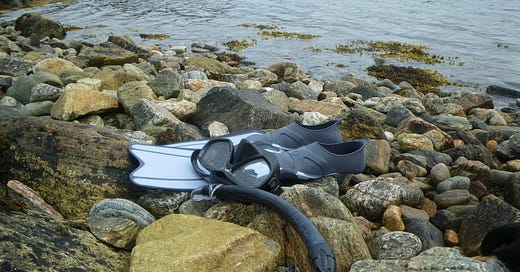dispatch from an archipelago called Earth
Hebridean encounters and ferry terminals; ways of seeing, being, in conversation with Arnalds, Berger, Darwish, Godfrey-Smith and Shakespeare
As the clock hands touch midway through the day, the coast sinks. The vessel breaches into the open sea, the clouds too thick for the sun to pass on good news, the water as intransigent as the colour of petrol, rolling and rolling against the ferry’s rusty shell. There are yellow warning signs hanging on each one of the heavy-duty doors: risk of trapped fingers. The cafeteria is crowded, serving hot meals and drinks, sick bags are piled on the windowsills above the royal-blue carpeted floor, and the ferry’s heavy carcass struggles against the gale, drilling in loudly. Sometimes around 2 o’clock, Leopoldo throws up, lying flat on his belly with his paws glued to the floor, scouting for something palpable. That is, reliable. I too lay low, flat on my back on the sofa in the pet area, with my eyes locked on the ceiling, until the storm passes.
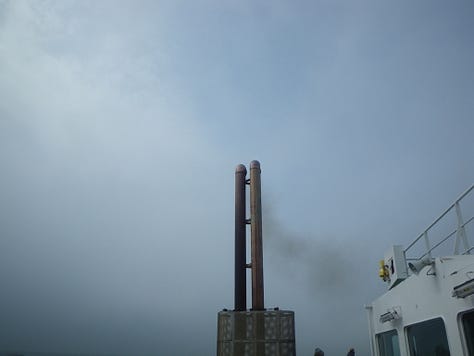
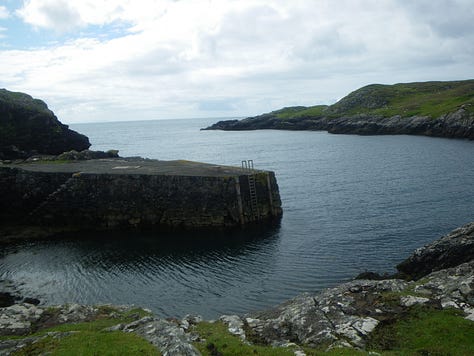
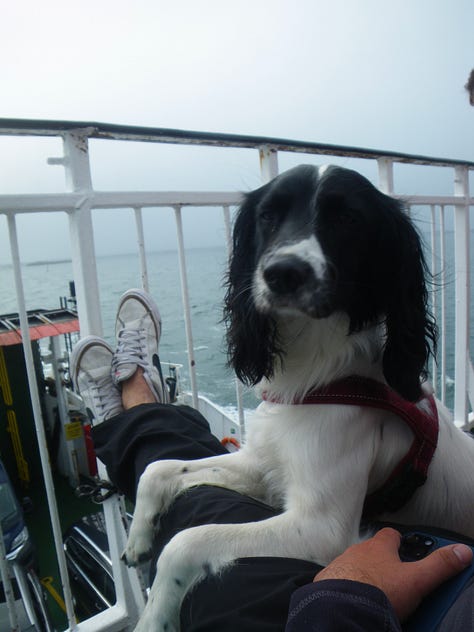
I. Castlebay, Barraigh (Barra)
Outside of the hostel, the Atlantic awakes and the sailing boats down in the harbour are rocking with the waves. The sky bursts like an egg yolk on a good Sunday, flowing in through the bay window then bouncing back against the steel of the sink. In the kitchen, a dance is taking place. I am told, not without a tease, that neither the owls nor the sun ever quite sleep around here, not at this time of the year, which makes me suspicious. I think that I have never seen an owl in the wild before. ‘Where are the knives?’ The question startles me, someone else is looking for the scissors; water boils, I pour in two spoons of bouillon to make a simple vegetables soup, something warm I know; velvety ravioli come in sweet as two peeps chat next to the hob, until the unsettling smell of burnt toast overtakes us; or is it me, is it real, the microwave rings, two-minute golden syrup porridge on the way back to the bunk beds with the silent woman. I throw in the cubed carrots, then the sliced courgette, thinking twice about what comes next. Borlotti beans. All food stored overnight must be labelled. In the communal kitchen, appetites are fraught – if it is dinner here, it is always breakfast somewhere else. Is it summer yet, or winter still? Muggy, wet.
‘Where are you’from?’ I am asked.
G. is French too, and this is his first time in Scotland. He talks me through his itinerary along the Hebridean Way, then back on the Scottish mainland and through the Highlands. He asks for tips about Glasgow, hopeful that he will end his journey there, before taking a train down to London to catch a plane back to France. He explains that he couldn’t find a direct flight to Scotland from where he lives. I nod, signalling recognition: Paris isn’t France.
‘The relation between what we see and what we know is never settled.’ As John Berger wrote in Ways of Seeing.
Islands are often described as microcosms, but dictionaries are to the theorist what data is to the scientist. Let it be studious and consider the origin of the word, from the Old English īegland, so īeg “island”, meaning ‘watery, watered’ plus land.
Not only Barra is connected to Scotland mainland through a regular ferry route, but it is also famous for its airport, which is rumoured to be the most scenic one in the world. Located on the Tràigh Mhòr, also known as Cockles Sand, there are two flights a day for and from Glasgow (depending on weather and tides) that take off and land on the beach.
Still in Ways of Seeing, Berger goes on with an old and relatable image, forasmuch as it is a transnational experience:
‘Each evening we see the sun set. We know that the earth is turning away from it. Yet the knowledge, the explanation, never quite fits the sight.’
In Castlebay, an overnight deluge means that we wake up to a briny smell. Down the pathway, the tide is low, so the beach is long, grey and wet with kilos and kilos of pungent seaweed scattered, hundreds of flies roaming. I am feeling toasty, between the resistance of my blood as it heats up and the wind that is blowing at gale speed, restlessly hitting my bones, harder each time I find enough strength to set a foot forward. I am ice, soon to liquify, crisp and cold, alert, so we set off to our next stop.
As I get in the car, I look back for G., but it seems that he has moved on too.
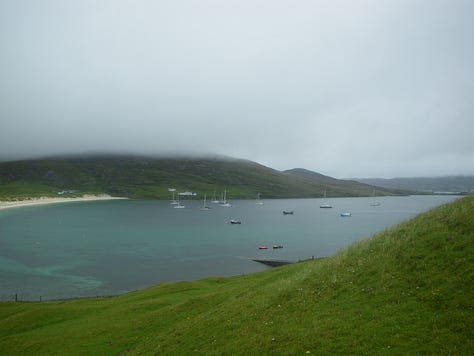
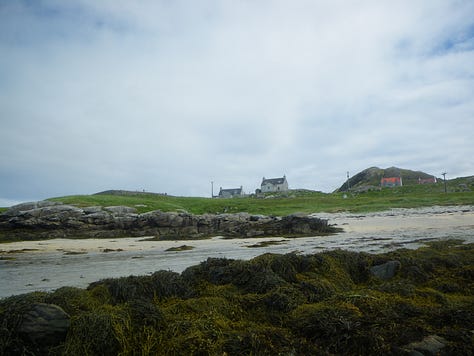
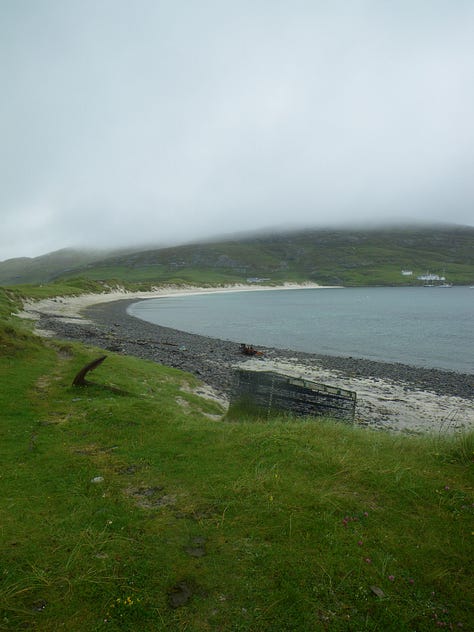
II. Coilleag, Eirisgeigh (Eriskay)
The journey through the sound of Barra is short. If we could see the coast before boarding, the island had looked empty until we approached its shore and began counting sheep, then croft cottages as they sprayed colours over an otherwise dull morning. Red doors, green tractors, orange rain jackets.
We disembark and head to the community centre. It is Monday, the heavens are spitting on us, two teenagers are brewing teas and filter coffee, handing cups over to folks as they arrive. The most patient waiting line goes a long way for the baker, so I smile, nodding back at the old man wearing a tee-shirt but a woolly cap. Newcomers, his wistful eyes suggest back at me.
Islands are fragments from a whole. An archipelago, from the Italian archipelago, “the Aegan Sea” then extended to ‘any sea studded with islands’.
If you look at a map of the Outer Hebrides, water stitches the archipelago together, each one of its islands hanging like a piece of rag between lochs and causeways. The machair runs along the outer coast like a ribbon, fiddling but soft, and in August it is bursting with yellow buttercup and corn marigold flowers. There are shy hills that have influenced where Hebridean people settled and stayed, like the deserted heart of Barra, cross-stitching until Harris, where the land rises and the Atlantic is swallowed by the valleys. If each one of them is heathery, earthy, there are mussels bearding on the rocks in the lochs. If life may be and remain over time, nothing ever is either or the other solely.
‘Why don’t we all live for a longer time? On mountainsides in California and Nevada there are pine trees that were alive when Julius Caesar was wandering around Rome. Why do some organisms live for dozens, hundreds, or thousands of years while others, in the natural course of events, do not see even a single year pass? Death from accident or infectious disease is no puzzle; the puzzle is death from “old age.” Why, after living for a time, do we fall apart? This question is always lurking as the birthdays pass, but the short lives of the cephalopods make it vivid. Why do we age?’
— Other Minds by Peter Godfrey-Smith
I immigrated to the UK a few months before Britain voted to leave the European Union, in June 2016; I was living in London, a place one could argue to be an island within. As the city engulfed me in a whirlwind of dreams and disappointments, shifts and plays, I became accustomed to a discourse that justifies Britain’s culture, its economic policies and politics, imperial past and discriminatory immigration system by its so-called ‘island mentality’. Amidst the noise, I grew inattentive to the repercussions that stem from self-serving lies and the myths they entertain, like ‘British are sea-people’ and ‘the UK is self-sufficient’. In my mind, geographically speaking at least, the United Kingdom had narrowed down to this one island where I had moved. A robust microcosm that allowed me to work, notwithstanding to earn a living! Hear hear, an island that doesn’t need the EU to thrive, or anything foreign. Only I had othered the problem by refusing to see it. Then I sailed away to the Scottish islands, and I kept going back because there was always more to see, more people to talk to about the challenges of life on an island as EU fundings for farming were being cut, no fishing deals were agreed, as the climate spirals, collapses, as the months pass and as I continue to learn about different bird species, ever since migratory routes obey to weather coordinates primarily.
Great Britain is made of at least five thousand islands and several island groups, such as Shetland and the Hebrides. It is part of an archipelago called the British Isles. And people who live across the British Isles speak different languages and dialects, hold different beliefs, follow different traditions, as each island ricochets from one cliff on to the other, as time skims stones until, eventually, the concept of Great Britain sinks into the open sea.
‘If you focus on the large fossils, you miss most of the life that is present’, philosopher of science and scuba diver Peter Godfrey-Smith also wrote in his illuminating study of the evolution of intelligent life and the octopus.
Like most islands I love, Eriskay is compact. Under the three-square miles mark, the water is always at sight, working like a compass. At the top of Ben Scrien, I am speechless. Peaks, plainscapes, aquamarine water, white-sand beaches, long rocky arms: Eriskay is voracious with textures, plentiful with vegetation, unless you love trees. Wherever you are heading, the wind will face you. Islands are both limited by land and infinite with water. Currents meet and tangle, bird pairs fly away, then return to their burrows on the shore of the same island, time and again, as everything coincides before everything else bounces back, time after time, chirping in a cacophony, conversing.
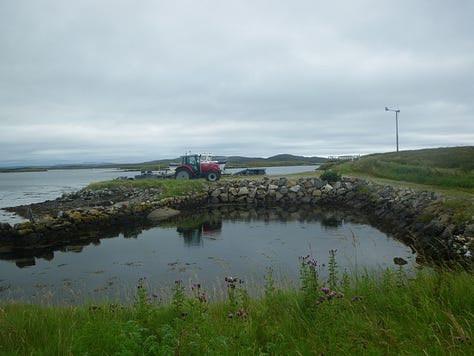
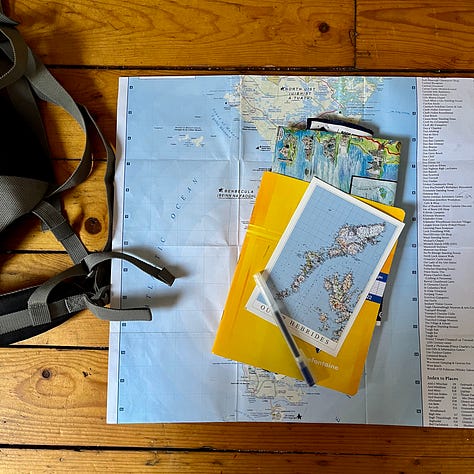
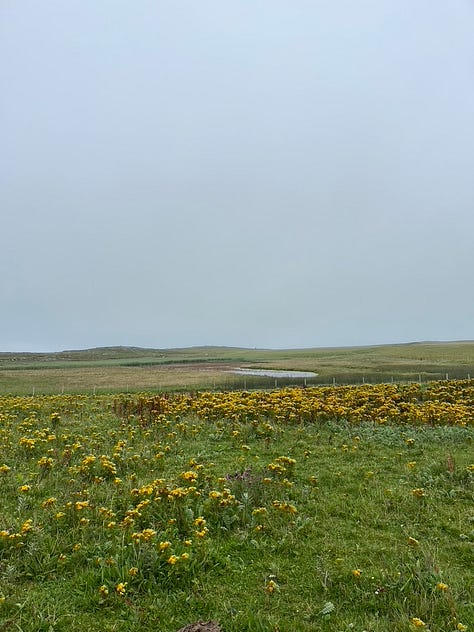
III. The Uists: Uibhist a Deas, Beinn na Faoghla and Uibhist a Tuath
There is a bridge crossing the narrow sound of Eriskay. On the other side, South Uist is flat. The meadows prolong the land without an end in sight but plenty of wild orchids, buttercups and large daisies grow tall and colourful.
North Uist steals my heart, holding on to the mainland as firmly as clenched fists, breaking into skerries, the mist thick and rolling over the small hills. On each side of the precarious road, the land seems to be drowning as we venture further into the marshes, my holed hiking boots soaking into the bogs that precedes the countless small lochs, the vegetation buoyant with moss and green with fern, and the occasional water lilies sparkling in yellow, like mirages beyond the veiling fog. On Flodaigh, there isn’t a cat in the night. But it isn’t quiet, gulls squawking relentlessly and the water hitting the rockface. A rising tide is never silent, so is island hopping: my kind of solitude amongst the raging sea and the ravenous seabirds. Squawk squawk squawk, strident and hissing. On Grimsay, we walk down to the port, guided by our stomachs’ acute sense of smell. Fishermen tie knots, smoke, work. We sit down on the trustworthy cement of the pier, breaking crab claws and langoustine shells, then we pick the leftover meat from underneath our gums with our nails, chatting away at the sea before us.
Language unlocks us as the gulls land near us. Once a migratory bird, British seagulls have mostly become sedentary over the years, mimicking humans’ behavioural patterns. Circling back to the etymology of the word island, in place names, the Old English ieg is often used as ‘slightly raised dry ground offering settlement sites in areas surrounded by marsh or subject to flooding.’
Between two tides, we head back to the estuaries on Benbecula and watch out for the sand burrows. Knees deep into the moving sands, hunching our backs, this is a chore drawn from patience. But comes the evening and, with a little parsley, garlic and olive oil, there are cockles to mop off a pan for a hopeful’s dinner.
There are fewer shops as we venture inland. We fuel on tinned meals – haricot beans and sundried tomatoes, mackerel and chickpeas salads; minestrone, fagioli all'uccelletto, fit-it-all casserole – and the panda stinks of old socks and wet dog, everything is sandy, scratchy, scrubby. Salty. At least until C. rescues us with a key for the caravan at the bottom of her croft. Turns out C. lived two streets down from where L. and I now live, until she and her husband moved back to the island to take over the family farm. C. asks me if the sweet shop on Byres Road is still open as she drops a small plate on the kitchen counter. She has wrapped two brioche buns and wee butters with some cling film. She details how much she loved living in Glasgow, her voice perking but frail as she holds on to the door frame with one hand, the heel of her foot slightly lifted. She had a surgery on her knee recently, she details, keeping an eye on the dog too. I push Leopoldo away, so I can enjoy a few more of C.’s stories. I had felt lonely until I had come out to the islands and be surrounded by waters again, reliant on the few people we meet now and there, and again.
As the evening chimes in, the light dims to a darker shade of grey. I am walking down the countryside road below C.’s house when I make sense of its presence, with my ears first, its lyrics harsh and throaty when everything else is quiet – there, an owl had landed with near me with its heart-shaped face. If brown, short-eared owls are more common in the Outer Hebrides, the animal’s beige back and white underparts give the barn owl away. Barn owls are sedentary birds unless harsh weather conditions and a threatening environment, such as road traffic, uproot them, in which case they may travel a short distance to nest and find food.
I meet the owl again the next day. The bird is sitting on a fence at dusk, its eyes round like globes. I wave goodbye to C. through the window, she at the kitchen sink and I behind the wheel, still dragged onwards by the appeal of the ultramarine and whimsical North. On the way, we stop at the distillery on Benbecula to find a handwritten notice taped on the door: ‘Closed until further notice due to a bereavement in the family’. We drive away quietly.
It is said that a screeching owl is an omen of death. ‘The clamorous owl, that nightly hoots and wonders at our quaint spirits.’ Shakespeare wrote in A Midsummer Night's Dream. And, as I remember the words, carnivalesque tales and costumes, the sky begins lifting.
‘I started to wonder if the sun ever shines here,’ L. says.
Halfway through a battling hot and stormy summer, I tell L. that an owl is said to predict bad weather too. Yet, once a common sight in the British countryside, the bird population is declining rapidly. The owl who can see in the night stands for what I cannot see in the dark.
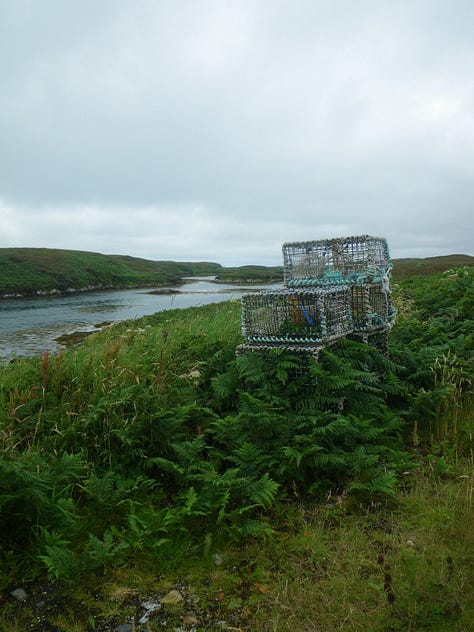
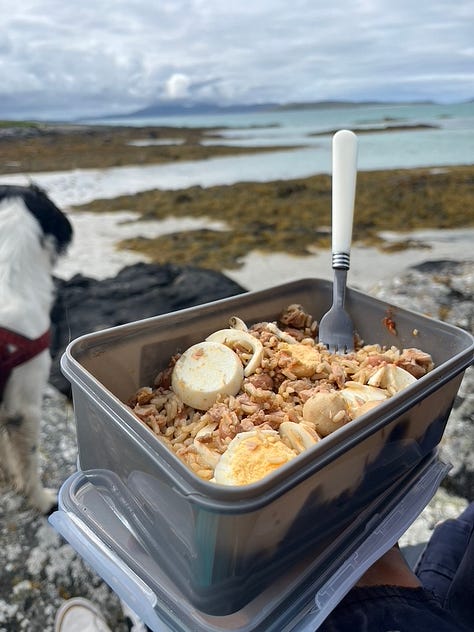
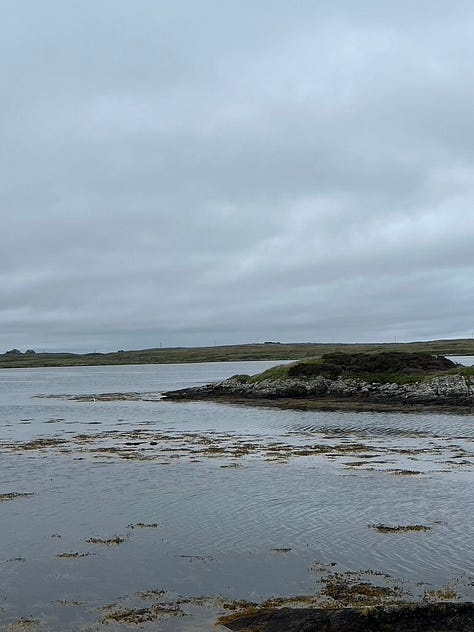
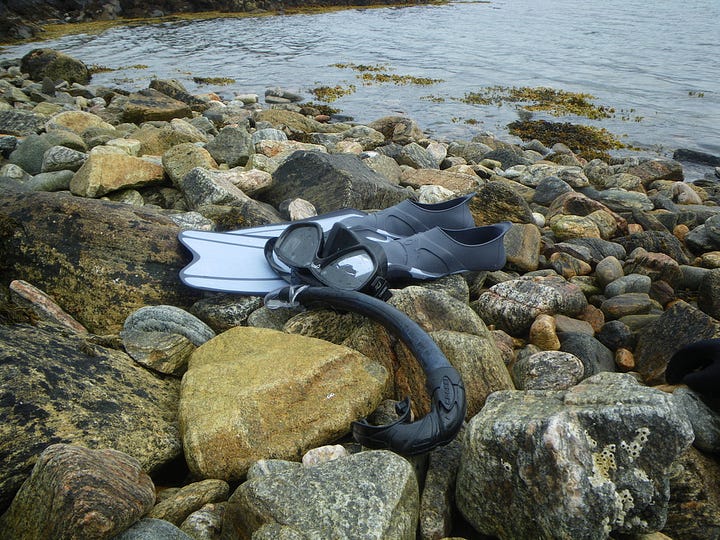
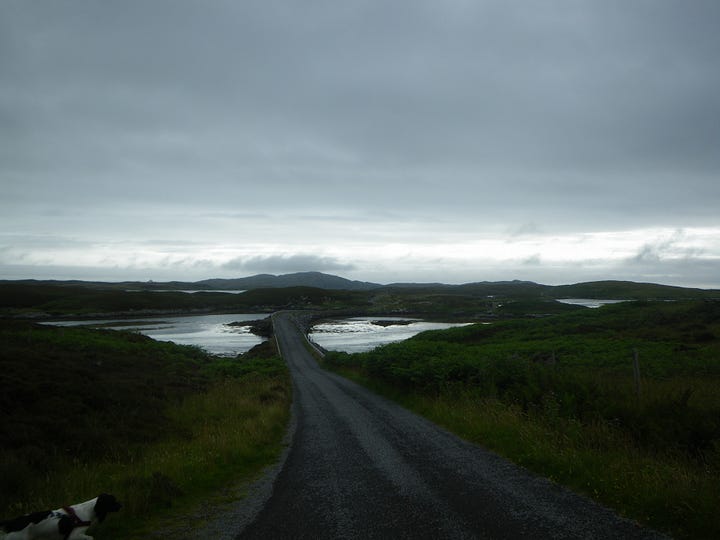
IV. Leverburgh, Na Hearadh (Harris)
The ferry ploughs along the southside of Berneray then back north, towards Leverburgh. We follow the scenic road through South Harris under the rain, rainbows popping up as we go uphill towards Lewis. Wild Lewis is impossible to capture either in words or photos, beaten up by winds and rinsed in blinding white light. In rain, too, a boggy land or feast for the midges. Flat, endless purple plains at its heart until its rocky shores, where the marram grass grows close to the dunes. As soon as the sky clears, the corncrakes can be heard, and it is time to head out.
On Great Bernera, a man asks if the blue car is mine. It is, I tell him while looking at the kayak gears spreading around both our cars, before I add not to worry. I also have a lot of crap to pack away. I’m minding my own business when he also asks if I have gone in the water already. I have, so I give him a few tips about this enclave I found, generous with pink sea urchins, shells and a golden kelp forest. I share that it is my favourite snorkelling place around here and, exhilarated, I even disclose that I spotted a gannets frenzy and two whales at the north tip of the island, near the uninhabited Bèarnaraigh Bèag. He thanks me, moving the conversation on. He also had a recommendation for a good swimming spot.
On our last day, we get into the water by Luskentyre Beach just before 7 o’clock. The thin sky is dyed in lilac and the water melts inside it, bruising. It is raining but lightly, the sea feels warm in contrast. As we run back to our towels, the sand is as cold as snow, the air as sharp as needles, pinching our skins, so glacial it burns. We are buzzed, ecstatic this early in the day, looking ahead across the still and quiet sea as we get changed. I choose to drive barefoot, full of sand through the golden road on South Harris. With forestry glens on one side and the ocean on the other, my ears pop, but it is L. who says it first. Islands remind him about the boundaries of Earth. Soil melts, cliffs take a plunge. We live on a water planet. We must cross seas if not borders to encounter and to be met with others, look outwardly, exchange beyond the remit of a known language and a familiar culture. On the side of the peripheral roads, rounding each island, it has been impossible not to notice the abandoned thatched blackhouses and battered, recent constructions either. Deserted islands are reminders that one’s holiday was someone’s home once. Is one’s root.
‘One day I'll become what I want
One day I'll become a poet
Water obedient to my vision
My language a metaphor for metaphors
I don't speak or indicate a place Place is my sin and subterfuge
I am from there
My here leaps from my footstep to my imagination ...
I am from what was or will be
I was created and destroyed in the expanse of the endless voidOne day I'll become what I want
One day I'll become a vine
Let summer distil from me now
so passers-by beneath the chandeliers of this most sugared place may drink my wine!
I am the message and the messenger
The small addresses and the postOne day I'll become what I want’
— ‘Mural’ by Palestinian poet Mahmoud Darwish (translated by John Berger and Rema Hammami)
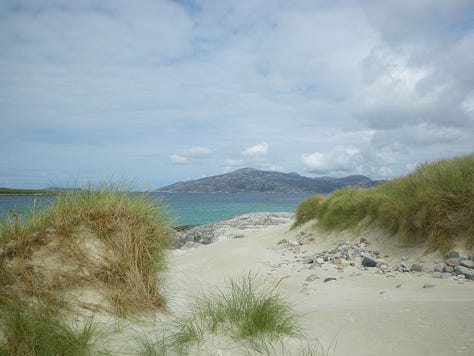
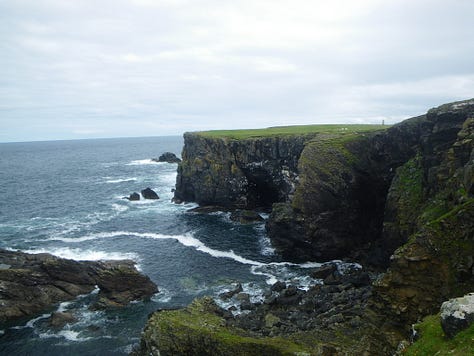
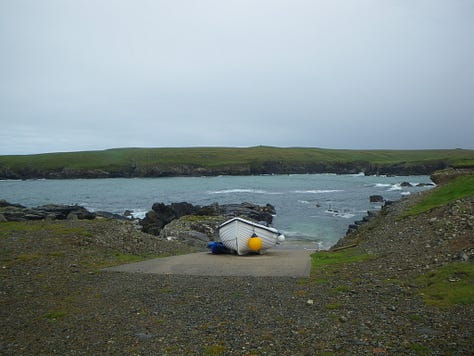
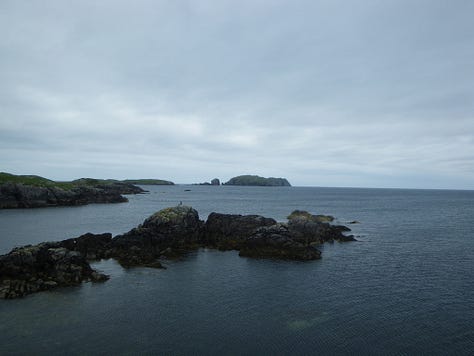
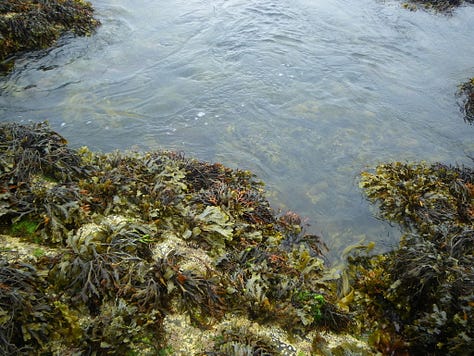
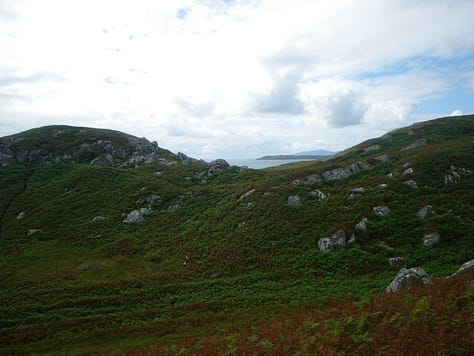
V. Uig, An t-Eilean Sgitheanach (Skye)
We return to the Scottish mainland through the short Skye bridge. Lochs stretch flat and wide on one side of the road, long high pine and hazel trees shadow us on the other, until we reach the iconic valleys of Glencoe, ever so tricking with the light. Like a dive, it is claustrophobic at the bottom yet endless, as it opens up on to the sky. It is a drive I know well, but it will never stop surprising me. Each season has its palette, each day as its heat or lack thereof and, as the spring tides wrestle with the weather, each hour brings its element for change. Leaves brown, fall, blow, and the grass is carpeted in thick pollen while wildflowers succumb to the thunderstorm, and the river overflows. We stop on the bank of the loch to shake our legs. Venus is as bright as a diamond, small and far away from Earth.
‘Here is your name,’ says the woman in Darwish’s poem about the passover from life to death, and it continues, as she vanishes: ‘in the corridor of her whiteness’:
‘Oh my name: where are we now?
Speak out: what is now what is tomorrow?
What is time and place?
What’s old what’s new?’
As the last glimmer of a day’s tone relinquishes, the greenish undertone of night’s blue reminds me of the light when I am snorkelling, as bright sunstreams hit the sandy ground and how, in that brief instant, I can’t make sense of the difference between life on Earth and life under water anymore.
There is no archipelago like Earth.
margaux
thank you for reading The Onion Papers. i’m margaux, a writer and cook, and this is my hybrid newsletter. if you enjoy my work, remember to subscribe and/or invite friends to the party as you keep me going.
PS. i write novels too.


